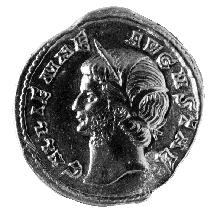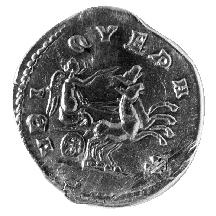



(120) Gallienus - AV aureus, c. A.D. 267, 6.65 g. (inv. 91.226).
Obverse: Head of Gallienus l., wearing wreath of reeds;
GALLIENAE AVGVSTAE: Gallienus Augustus.
Reverse: Victoria in biga r., holding whip in r.;
VBIQVE PAX: peace everywhere.
Provenance: Münzen und Medaillen, 1971.
Bibliography: P.H. Webb, The Roman Imperial Coinage
V.1 (London 1927) 121; J.P.C. Kent, Roman Coins (London 1978)
315 no. 496.
Gallienus was first co-emperor with his father, Valerian. He was put in
charge of the West and initially had success dealing with German tribes
at the northern frontier of the empire. In A.D. 260 Valerian, who was fighting
the Persians in the East, was captured by the Persians, and Gallienus began
his sole reign amid chaos, with a series of revolts in several regions and
the usurper Postumus in control of much of Germany (see no. 121).
Within several years he had regained control of most of the troops but had
not succeeded in dislodging Postumus when he was killed by conspirators.
Gallienus' last major victory, over the Heruli in the Danube region in A.D.
266, appeared so decisive that the emperor celebrated the victory with a
depiction of Victoria and a declaration of universal peace on the reverse
of this coin. The puzzling image and legend on the obverse have been variously
interpreted. The grammatical form of the legend has been read as feminine
and as a comment on the portrait itself, in which the emperor wears a wreath
of reeds usually associated with nymphs. But such a construction seems highly
unlikely on official coinage, and the most probable reading of the legend
is that it is a form of the vocative, an acclamation, which would normally
read Galliene. The distinctive portrait shows Gallienus with much fuller
hair and beard than most of his immediate predecessors, apparently an allusion
to past emperors such as Hadrian, whom he admired.
C.L.L.



All contents copyright (c) 1996.
Lawrence University
All rights reserved.